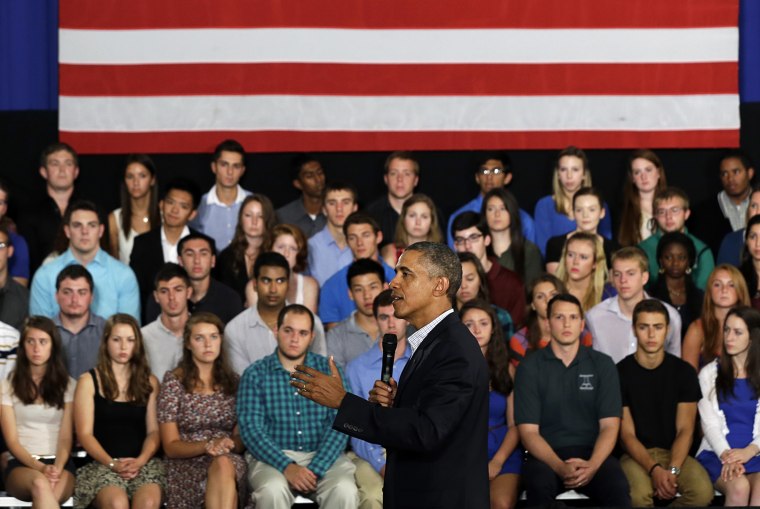As President Obama launches a new push for his signature health care law, he needs to convince the group most critical to its success -- young voters.
According to a Harvard Institute of Politics, the president is bleeding support among 18-29 year old voters, who are not just pessimistic about the new health care law, but are also unlikely to sign up, robbing the insurance exchanges of the young, healthy voters they need to make the program a success.
Just 39 percent of 18 to 29 year-olds say they approve of the new health care law, with 56 percent disapproving. Forty-four percent said they believe quality of health care will get worse under the new law, and just 17 percent say the quality of care will improve.
Fifty percent believe the law will increase the cost of health care for them. And because of that, 47 percent of the critical demographic needed for the law's success say they're unlikely to enroll in the online health care exchanges.
The new poll comes as the White House and Democrats are renewing their sign-up push, now that the majority of bugs from the health care website have been fixed. One way they're looking to speak at younger voters will come Thursday night, when Hardball host Chris Matthews will interview the president at American University in Washington, D.C.
But the president's problem with young voters isn't just because of their disillusionment toward the health care law. Forty-nine percent say they believe the country is headed in the wrong direction, with just 14 percent say the U.S. is on the right track. The president's approval rating among 18-29 year olds tracks closely with his margin nationally -- just 41 percent say they approve, down 11 points from the university's April survey, and his disapproval sits at 54 percent.
Congress and its leaders are even more unpopular: Republican Speaker of the House John Bohener has a 75 percent disapproval rating, while 59 percent say they disapprove of the job Senate Majority Leader Harry Reid is doing. Young voters are split on whether they'd vote to re-elect their own member of Congress, but 52 percent say all members of Congress should be ousted.
Former appointed Sen. Mo Cowan (D-Mass.), currently a fellow at the Institute of Politics, admitted that the numbers should be a wake-up call for Democrats, particularly in how they're selling the health care law.
"We have a lot of work yet to do to talk about the good that is in this bill and to dispel the misinformation that remains in the mainstream marketplace about the law," Cowan said on Thursday's The Daily Rundown.
IOP Director Trey Grayson, the former Kentucky Republican secretary of state, said on The Daily Rundown that it's not all good news for the GOP though. While younger voters identifying as Democrats has dropped in the past four years amid an economic downturn -- down from 43 percent to just 31 percent since 2009 -- Republicans haven't picked up those voters. Younger GOP voters remain relatively static at 25 percent. One of the reasons? Social issues, gay marriage immigration reform and other issues are among those that have turned millennials off from the Republican Party.
"For Republicans to take advantage of the opportunity that's been handed to them, they're going to have to handle the [marriage equality] issue really well," said Grayson, noting most young Republicans on college campuses tend to be more supportive and open to legalizing gay marriage than older GOP voters.
The frustration with the president could resonate in the 2014 midterms too, largely because of an anticipated drop-off in younger black voters. According to the IOP poll's predictions, African American turnout is expected to drop 12 points, while a make-up of 36 percent younger white voters and 28 percent younger Hispanic voters will stay the same.
"I think both parties are going to have to do a lot of work for 2014 and 2016 in terms of rebuilding the trust and faith in everyone's feelings about the government," said Cowan.
The former Democratic senator said his party has a "tried and true" get out the vote operation that he's confident in, but that both parties should heed the warnings in the Harvard poll when they target young voters.
"They're up for grabs," Grayson said of young voters. "They have a general distrust for institutions and a general dissatisfaction with current leadership. But they've shown that when you talk to them, when you engage with them, when you inspire them, they're going to vote, they're going to volunteer, and whoever does a better job of that is going to have a lot more political success on Election Day."
The Harvard poll of 2,089 young Americans was conducted October 30-November 11 with a margin of error of +/- 2.1 percentage points.
